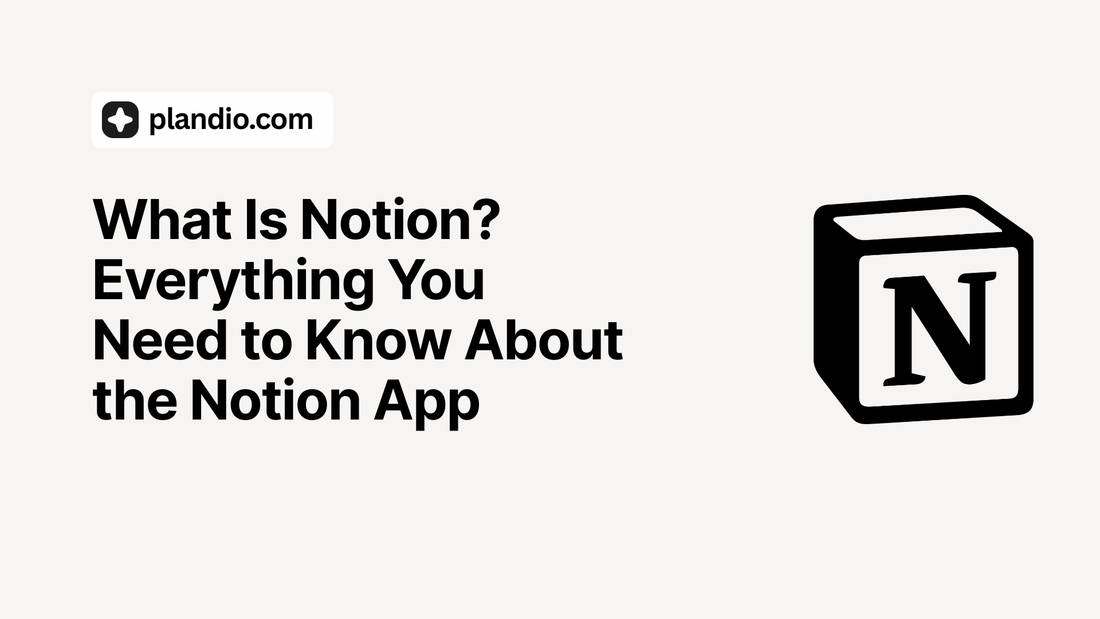What Is Notion? Everything You Need to Know About the Notion App
Share

If you’ve ever searched “what is notion” or “what is a notion app”, the answer is simple: Notion is an all-in-one productivity and collaboration platform that lets you write, plan, and organize everything — from personal notes and tasks to company projects and knowledge bases.
Notion started as a simple note-taking tool, but over time it has evolved into a complete workspace that combines text editing, databases, wikis, and project management. It’s available on web, desktop (Windows, macOS), and mobile (iOS, Android), allowing you to sync your work across devices.
Why People Search “What Is a Notion?”
In English, “a notion” means “an idea” or “a concept,” so some users type “what is a notion” or “what is the notion” accidentally when they actually mean the app. Similarly, “what is notions” is a plural form often used by mistake. All of these variations point to the same question — what is Notion, the popular productivity tool.
Main Features of the Notion App
1. Smart Note-Taking and Rich Content
Notion allows users to create detailed notes using different types of content blocks. Each block can be a text paragraph, checklist, heading, image, video, file, or embedded link. You can organize information into pages and subpages, making it easy to structure thoughts and ideas in a logical hierarchy.
The app also supports comments and mentions, helping teams collaborate on shared documents without switching between tools.

2. Databases and Tables
One of Notion’s most powerful features is its flexible database system. Users can create databases with custom properties such as text, number, tags, date, checkbox, and more. You can filter, sort, and view data in different layouts like table, board (Kanban), calendar, or gallery.
This makes Notion suitable for managing projects, tracking clients, planning content, or organizing personal habits — all in one workspace.

3. Wikis and Knowledge Bases
Notion enables users to build internal documentation systems or wikis. You can link related pages, group topics, and create a clear information structure that helps teams store and access knowledge easily. Many companies use Notion as their internal “company handbook.”

4. Project and Task Management
Notion can replace traditional project management tools by offering Kanban boards, task lists, and calendar timelines. You can assign tasks, set deadlines, add status tags, and comment on progress. This flexibility makes it ideal for freelancers, startups, or teams managing multiple projects.
5. Real-Time Collaboration
Notion allows multiple users to edit and comment on the same page at once. Every change is synchronized in real time. You can share pages publicly, with specific people, or keep them private. The permission system makes it easy to manage who can view or edit content.
6. Cross-Platform and Integrations
Notion works across web, desktop, and mobile, syncing data instantly. It integrates with tools like Google Drive, Slack, GitHub, and Figma, and can be automated using services such as Zapier or Make. This makes it a versatile hub for managing both work and personal life.
Advantages of Using Notion
- All-in-one workspace: Combines notes, tasks, databases, and wikis in one app.
- Highly customizable: Build your own system — from a daily planner to a CRM — without coding.
- Clean and intuitive interface: Minimal design helps you stay focused.
- Rich community: Thousands of templates available to duplicate and customize.
- Cross-platform access: Use it on any device with cloud synchronization.
Limitations of Notion
- Learning curve: Beginners may need time to understand blocks, relations, and rollups.
- Performance issues: Large databases or heavy pages can become slow.
- No end-to-end encryption: Notion encrypts data but can technically access stored content.
- Limited offline mode: You need an internet connection to sync most changes.
- Not ideal for complex enterprise workflows: It lacks advanced analytics and reporting.
Notion Pricing Plans

Notion offers several plans for individuals and teams:
| Plan | Best for | Main Features | Price |
|---|---|---|---|
| Free | Individuals, students | Unlimited pages, limited uploads, basic collaboration | Free |
| Plus / Pro | Freelancers, professionals | Unlimited blocks, file uploads, version history | ≈ $10/month |
| Team | Small teams | Advanced permissions, team spaces, admin tools | ≈ $20/month |
| Enterprise | Large organizations | SSO, advanced security, audit logs, dedicated support | Custom pricing |
In addition, Notion offers Notion AI as a paid add-on. It helps users summarize text, generate content, and improve writing directly inside their workspace.
Who Should Use Notion?
Notion is suitable for almost anyone who wants to stay organized:
- Students: Create study plans, notes, and assignment trackers.
- Freelancers: Manage clients, deadlines, and invoices.
- Small teams: Collaborate on projects, documents, and workflows.
- Individuals: Build personal dashboards for goals, habits, and journaling.
- Startups: Set up team wikis, content plans, or lightweight CRMs.
Conclusion
So, what is Notion? It’s a flexible digital workspace that brings together everything you need to plan, create, and manage your life and work. Whether you’re a student organizing notes, a freelancer tracking projects, or a team building a shared knowledge base, Notion adapts to your workflow.
By understanding pages, blocks, and databases, you can transform Notion into your own personal operating system — the “second brain” that helps you think, plan, and execute smarter.